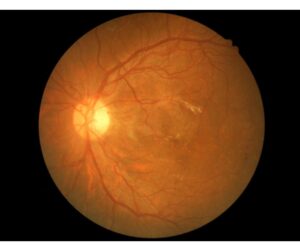Diabetic Retinopathy
Diabetic retinopathy is a complication of diabetes, it is caused by high blood glucose levels which damage the back of the eye, the retina.
The retina is a light sensitive layer of cells at the back of the eye that converts light into electrical signals. The signals are sent to the brain which turns them into the images you see. The retina needs a constant supply of blood, which it receives through a network of tiny blood vessels. Over time, persistently high blood glucose level can damage these blood vessels.
There are three main stages of diabetic retinopathy:
- Background retinopathy – tiny bulges develop in the blood vessels, which may bleed slightly but does not usually affect your vision
- Pre – proliferative retinopathy – more severe and widespread changes affect the blood vessels including more significant bleeding into the eye
- Proliferative retinopathy – scar tissue and new blood vessels, which are weak and bleed easily develop on the retina and this can result in some loss of vision
During the early stages of diabetic retinopathy, it is difficult to notice the symptoms, but as it advances you may notice:
- Gradually worsening vision
- Floaters – shapes floating in your vision
- Blurred vision or patchy vision
- Pain in the eye or redness
- Difficulty seeing in the dark
- Sudden loss of vision
If left untreated, diabetic retinopathy can cause blindness, however it does usually take several years for it to reach a stage where it could threaten sight. It is important that you attend your eye screening that is recommended by the NHS which should be annually. If you experience any of the symptoms or are worried, it is important not to wait until your next screening appointment, get it checked out when you can.
There are ways to be able to reduce your risk of developing diabetic retinopathy or to help prevent it from getting worse:
- Control your blood glucose, blood pressure and cholesterol levels
- Take your diabetes medicine as prescribed
- Attend all of your screening appointments
- Consult medical advice as soon as you notice any changes to your vision
- Maintain a healthy weight, eat healthy with a balanced diet, exercise regularly and stop smoking.
References:
Gov.uk (2022) Your guide to diabetic retinopathy. Available at:
https://www.gov.uk/government/publications/diabetic-retinopathy-description-in-brief/your-guide-to-
diabetic-retinopathy (Accessed on 5 April 2023).
NHS (2021) Diabetic Retinopathy. Available at: https://www.nhs.uk/conditions/diabetic-retinopathy/ (Accessed 5 April 2023).